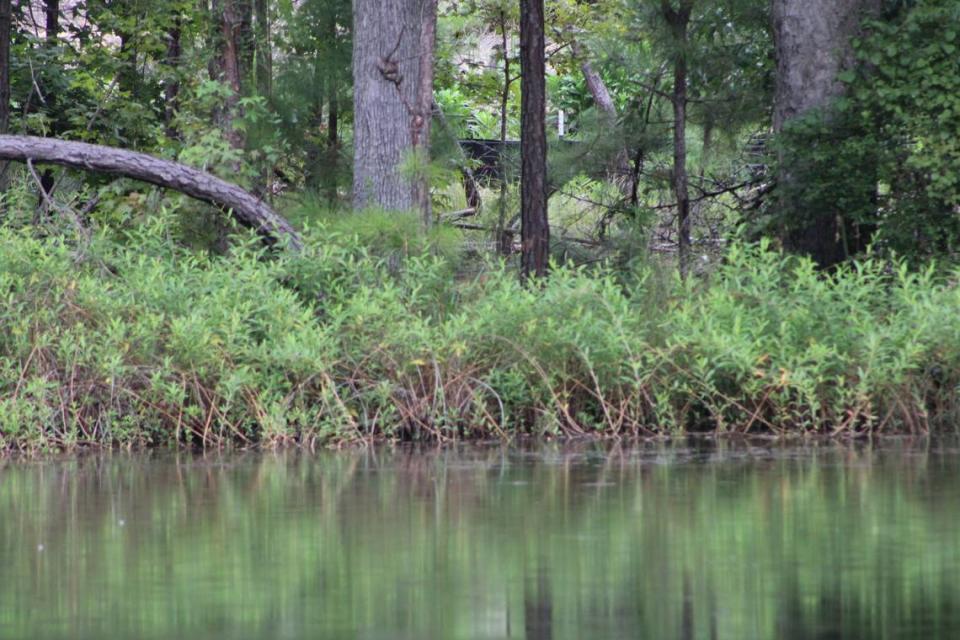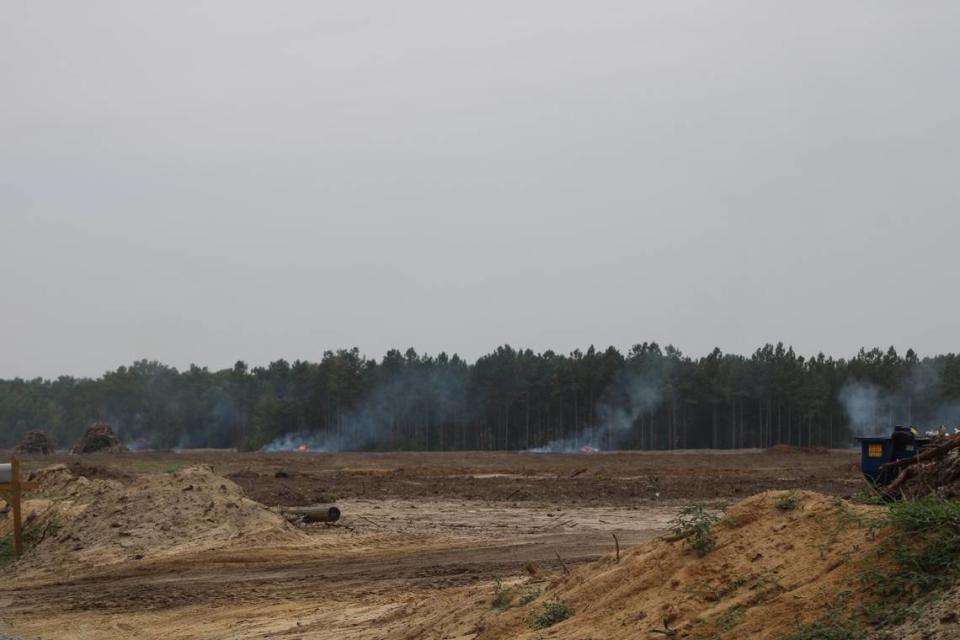SC agency urges against approving Scout plant until environmental questions answered
Dump trucks rumbled across the land near Blythewood last week, as work progressed on one of the most acclaimed economic development projects in South Carolina history.
Recently cut trees lay burning in piles at the Scout Motors site, smoke rising in the summer heat. Signs warned the public to stay off the property because of dangers from the busy construction effort.
The work is viewed as a sign of progress by those eager for the $2 billion plant to open, but the site preparation also is raising alarms from state and federal environmental agencies.
The U.S. Environmental Protection Agency says it has found evidence that a creek was being filled before the government authorized the work. The S.C. Department of Natural Resources says clearing and grading occurred before the agency could fully study the Blythewood property.
Because of its concerns, the DNR last month urged the U.S. Army Corps of Engineers not to issue a wetlands permit until extensive questions are answered about the project, including how developers will compensate for filling wetlands, creeks and lakes, according to an 18-page comment letter the agency wrote.
The EPA says it wants developers to look for additional ways to avoid wetlands.
In a July 31 letter to the U.S. Army Corps of Engineers, the EPA’s Rosemary Calli said some parts of the project site have been cleared, but the letter expressed greater worries about the project’s effect on streams and wetlands.
“Most concerning was evidence of work in aquatic resources,’’ wrote Calli, chief of the EPA’s wetlands and streams division in Atlanta. “The EPA observed new fill material in a tributary’’ as part of culvert work on the property.
Under federal law, it is illegal to fill jurisdictional wetlands without a U.S. Army Corps of Engineers permit, which in this case, has not been approved. The S.C. Department of Commerce and Richland County applied for the permit in early June.
The government protects wetlands because they soak up stormwater and prevent flooding; filter pollution; and provide habitat to wildlife, ranging from amphibians to birds.
While it’s unlikely the DNR and EPA concerns will stop the wetlands permit from being issued, agencies that review permit requests sometimes persuade the Corps to protect more wetlands and streams than initially proposed.
Corps ‘looking into’ matter
Calli’s letter to the Corps suggested there could have been a misunderstanding over the project’s impacts. A project consultant believed work affecting a creek was allowed along a road because it had been used for forestry, which is exempt from some wetlands rules.
But the letter said the “forestry operation is no longer ongoing,’’ meaning wetlands filling would not be exempt. The letter said the fill — described by those familiar with the project as gravel — may be a violation of the federal Clean Water Act, the overarching rule that protects rivers, streams and wetlands.
In addition, agency spokesman James Pinkney said clearing forests at the project site “may have an adverse impact on the aquatic ecosystem,’’ which is typically streams and wetlands.
Neither the Corps nor the EPA would say if enforcement action by either agency is pending, but Corps spokeswoman Glenn Jeffries said her department was aware of the work occurring on the Scout property.
“We are actively looking into that matter,’’ she said in an email.
Chad Johnston, a lawyer for the state Department of Commerce and Richland County, said wetlands have not been filled. The problem identified by the EPA was additional rock put down as part of work on a culvert and road at a stream.
Still, he said the site contractor “has gone to great lengths to not only preserve the wetlands and streams out there, but put buffers around them. There are no impacts occurring in those wetlands or streams.’’ Only after a permit is issued will wetlands and creeks be filled, he said.
The DNR and EPA comments follow a recent letter by two environmental groups urging the Corps to conduct a detailed study of how the project would affect water and wetlands in Richland County before any decision is made on the wetlands permit. The request by the Southern Environmental Law Center and the Congaree Riverkeeper for an environmental impact statement could delay the Scout project.
Scout’s project site, located near the intersection of Blythewood Road and Interstate 77, is at a Richland County industrial park that economic development officials offered as they sought to bring the automaker to South Carolina. The land is mostly high ground, but interspersed with creeks, ponds and wetlands.
The $2 billion Scout project will destroy up to 73 acres of wetlands, 38 acres of ponds and about seven miles of creeks.
In the first phase of the project, the automaker plans to construct six buildings totaling 3.1 million square feet. Other phases would include 25 more buildings totaling nearly 13 million square feet. As many as 4,000 jobs could be created, with Scout manufacturing 200,000 vehicles each year, state officials have said.
Scout Motors, a company recently created by Volkswagen, will be the world’s first manufacturer of the Scout electric vehicles.
Even though the Scout site was targeted for development, some people in the Blythewood area have been startled by the recent clearing and land-grading activity. Economic development officials announced the project in March.

Agnes Dial, a 66-year-old fruit and vegetable vendor, said she hates that the Scout project is taking a toll on the forests and wetlands around Blythewood. Until the land preparation work began, Dial said people would use a trail to access ponds on the Scout property.
“It was a beautiful place, with all the trees,’’ Dial said, noting that “people don’t like this. It’s going to put more traffic on the road. It going to really mess with Blythewood.’’
Her produce business, located at 311 Blythewood Road, is adjacent to land being cleared for the Scout plant. She said her landlord might be tempted to sell the property.
Optimistic predictions
Boosters of the Scout project say the plant will bring much-needed jobs to South Carolina and produce vehicles that are the wave of the future. Electric vehicles don’t pollute the environment or depend on the world’s finite supply of oil and gas, say project supporters.
Gov. Henry McMaster, a Republican, has been a major champion of electric vehicles and the Scout Motors project. At the time of the Scout announcement in early March, House Speaker Murrell Smith, R-Sumter, called the project “transformative’’ for South Carolina and the Columbia area.
Many environmentalists also like the project but have questions about the impact on the landscape.
Johnston, the attorney representing Richland County and the state Department of Commerce, said the issues raised by natural resource agencies are part of the routine process of assessing wetlands impacts from development.
The DNR’s July 21 letter offers multiple suggestions on how to improve the wetlands permit, including ways to restore a site near Congaree National Park as compensation for the losses in Blythewood. The letter also took note of the land clearing and potential effects on fish downstream from the project site.
“None of this is out of the ordinary and DNR’s commenting on the project is not out of the ordinary either,’’ Johnston said.
He predicted the concerns will eventually be worked out and will not stop approval of wetlands permits for the Scout plant.
Scout Motors said in an email that natural resource agencies have a working relationship with economic development officials and the company expects questions and concerns will be “adequately addressed and resolved.’’
While the DNR raised questions about work that already has occurred, Johnston and agency director Robert Boyles said most of the focus is on how developers will compensate for the loss of wetlands and creeks in Blythewood.
In this case, Richland County and the state Commerce Department have offered about 5,000 acres on the other side of the county near Congaree National Park as compensation for wetlands losses in Blythewood. The plan is to restore much of the southeastern Richland County property as an area of healthy wetlands and forests. By law, those receiving a permit to fill wetlands must offer to protect other wetlands as compensation.
Johnston said the wetlands offset proposal, or mitigation plan, was preliminary. In an email, Boyles said his agency’s comments were provided to help establish the “best mitigation plan possible.’’ Boyles said his agency does not oppose the project.
Bob Perry, a former DNR permitting official who now works for a company that helped develop the wetlands offset plan, said the wildlife agency’s concern is misguided.
His company, Water and Land Solutions, “is proud of the product that we produced on behalf of the Department of Commerce and Richland County,’’ he said. “We think it is a very good mitigation plan. It answers the requirements of the Corps of Engineers, and in many cases it exceeds the requirements of the wetland and stream impacts mitigation.’’



